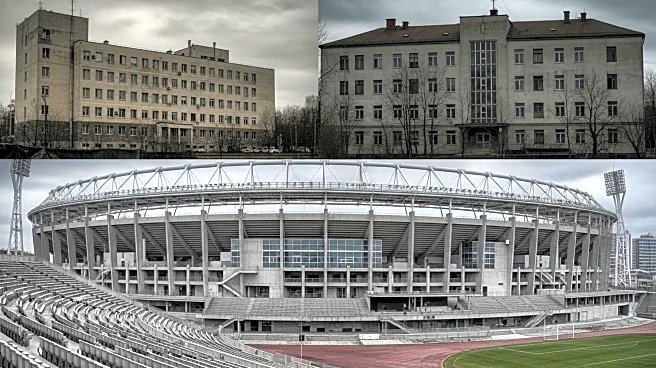What is the story about?
What's Happening?
In Morocco, citizens have taken to the streets to protest the government's substantial investment in sports infrastructure ahead of the 2030 World Cup. The North African nation is one of the host countries for the tournament and is constructing one of the largest football stadiums in the world, with a capacity of 115,000. The government has allocated $5 billion to these projects. However, many Moroccans are voicing their discontent, arguing that the government should prioritize healthcare and education over sports facilities. Demonstrators have been chanting slogans such as 'No World Cup, health comes first. We want hospitals, not football stadiums.' The protests have highlighted the public's frustration with the country's healthcare system, which they claim is inadequate and endangers lives. Prime Minister Aziz Akhannouch has expressed willingness to engage in dialogue to address the concerns raised by the protesters.
Why It's Important?
The protests in Morocco underscore a significant tension between government priorities and public needs. The allocation of substantial funds towards sports infrastructure, while healthcare remains underfunded, raises questions about the government's commitment to addressing essential services. This situation reflects broader issues of governance and resource allocation that can impact social stability and public trust. The protests could influence future policy decisions, potentially leading to a reevaluation of spending priorities. The outcome of this situation may set a precedent for how governments balance international commitments, such as hosting global events, with domestic welfare needs.
What's Next?
Prime Minister Aziz Akhannouch's openness to dialogue suggests potential for negotiations that could lead to policy adjustments. The government may need to consider reallocating resources to address healthcare deficiencies, which could appease public discontent. The protests might also prompt international scrutiny, influencing Morocco's image as it prepares to host the World Cup. Stakeholders, including international sports organizations and human rights groups, may weigh in on the situation, potentially affecting Morocco's plans and commitments for the tournament.
Beyond the Headlines
The protests in Morocco highlight deeper issues related to governance and public policy. The citizens' demand for healthcare over stadiums reflects a broader global challenge where governments must balance international prestige with domestic welfare. This situation could lead to discussions about the ethical implications of prioritizing large-scale events over essential services. Additionally, the protests may inspire similar movements in other countries facing comparable issues, potentially leading to a shift in how governments approach infrastructure development and public service provision.
















